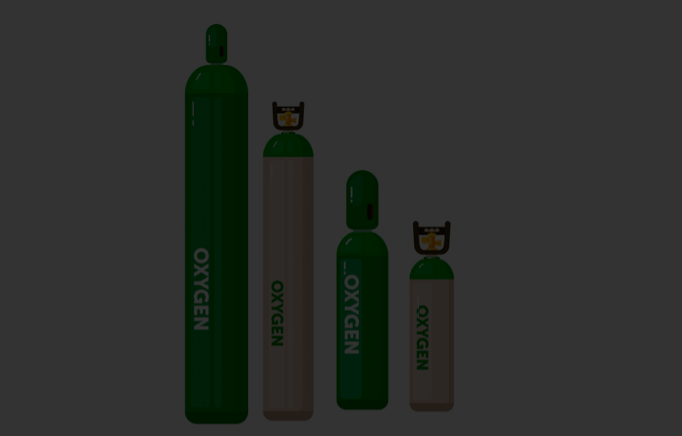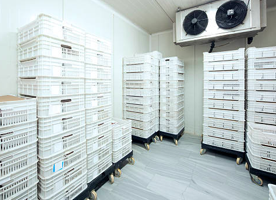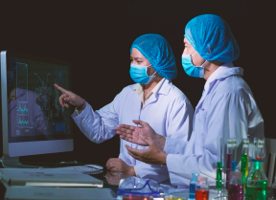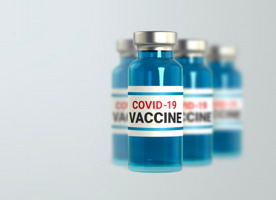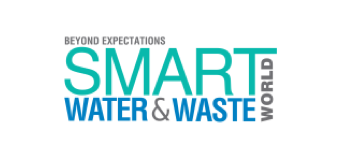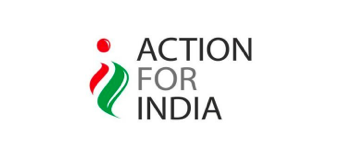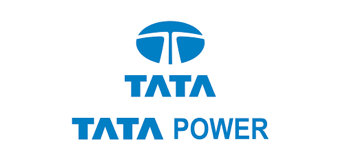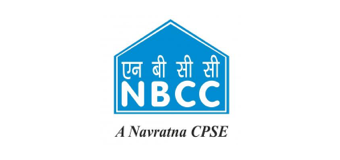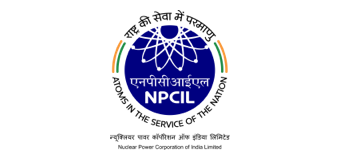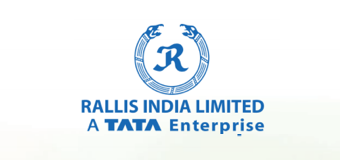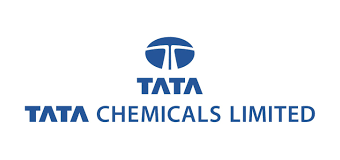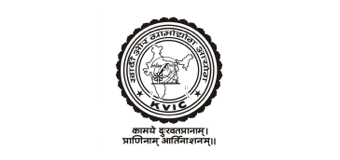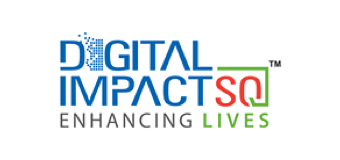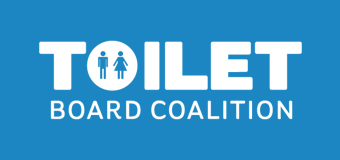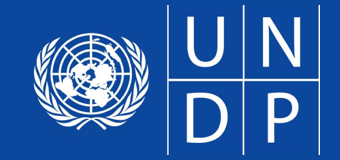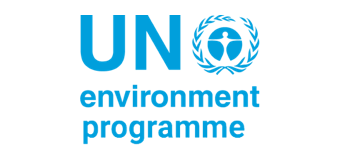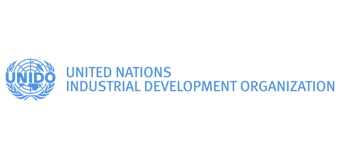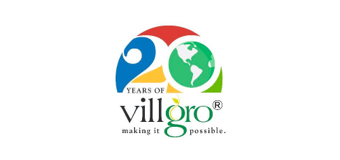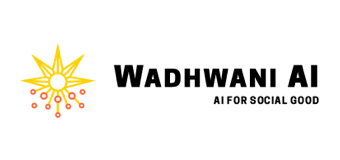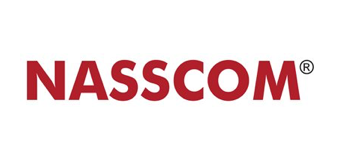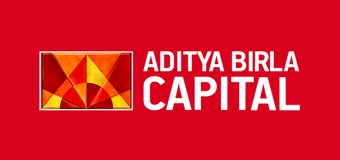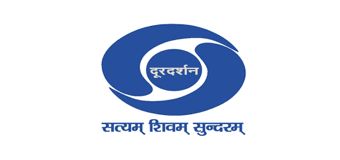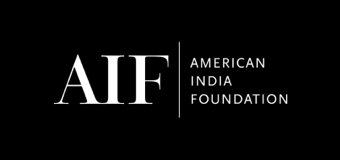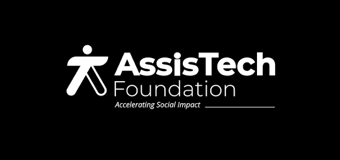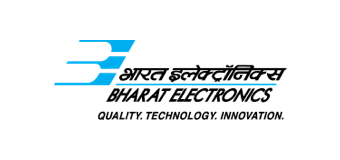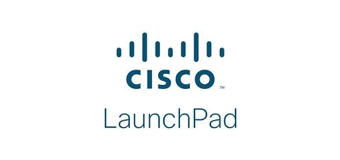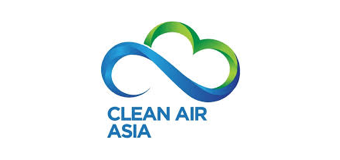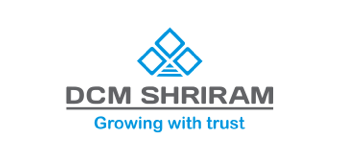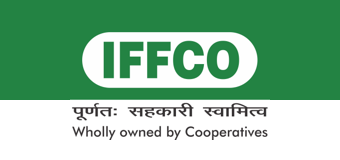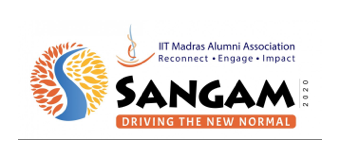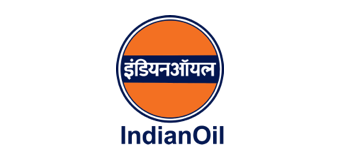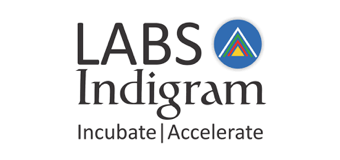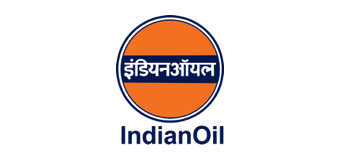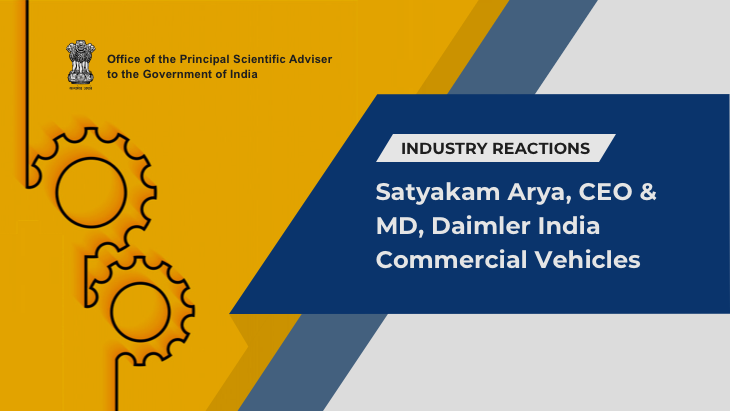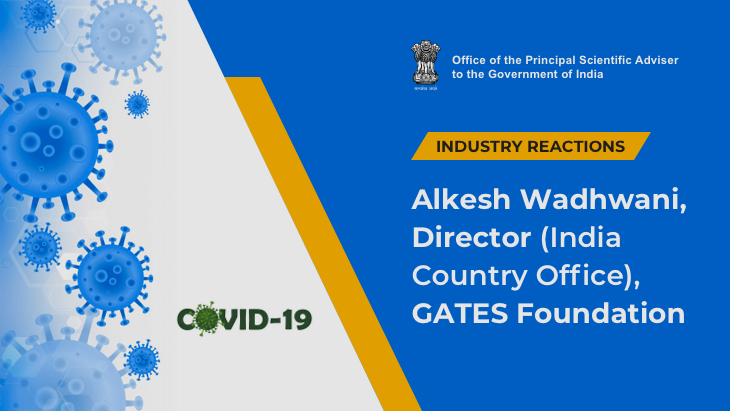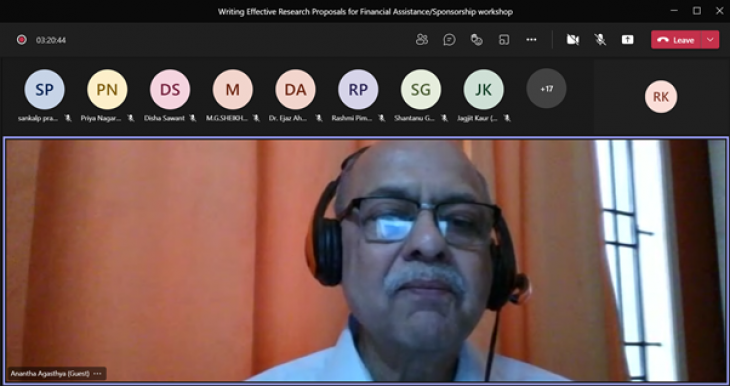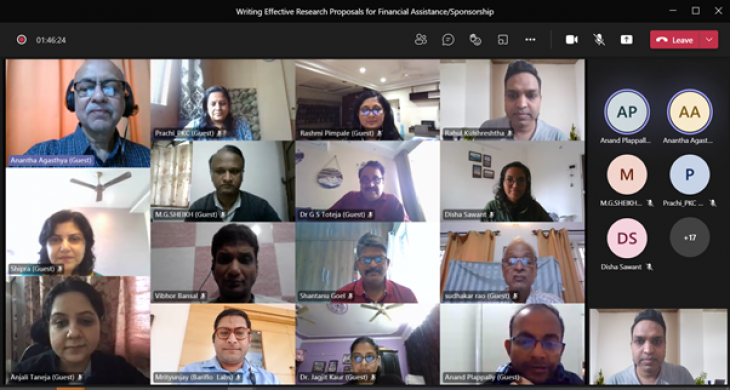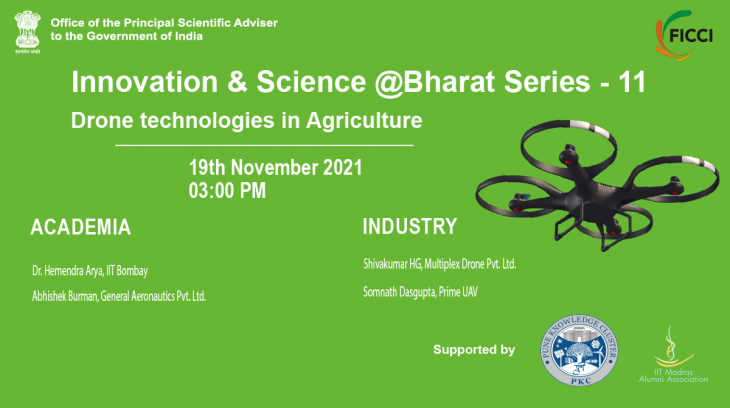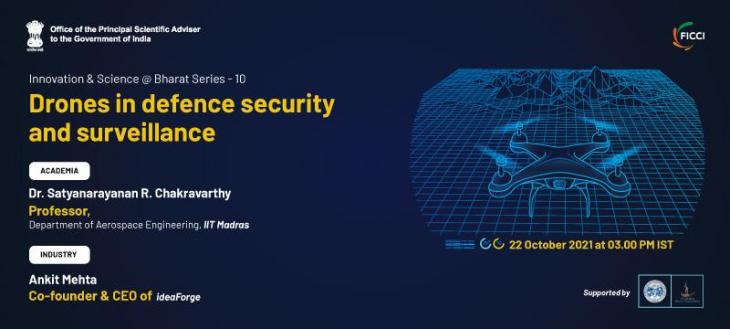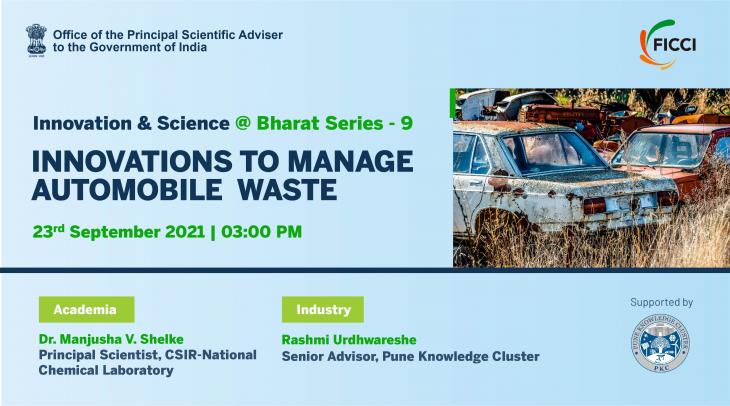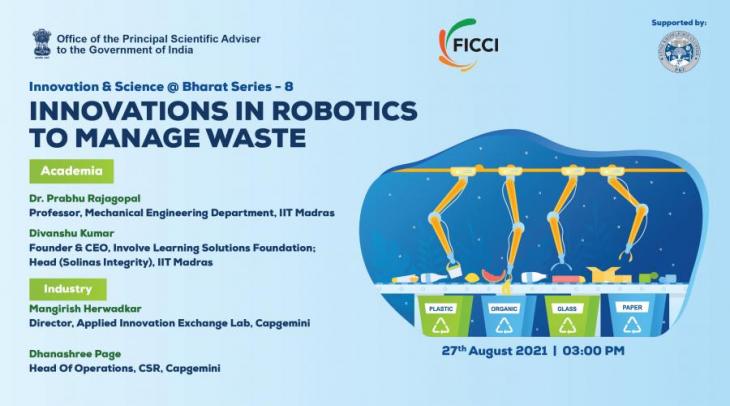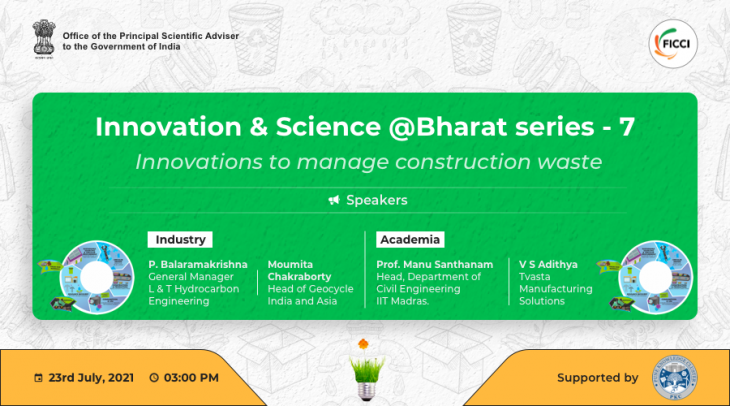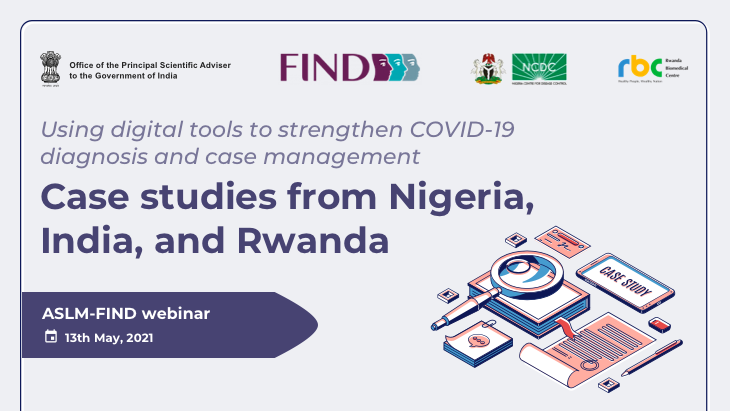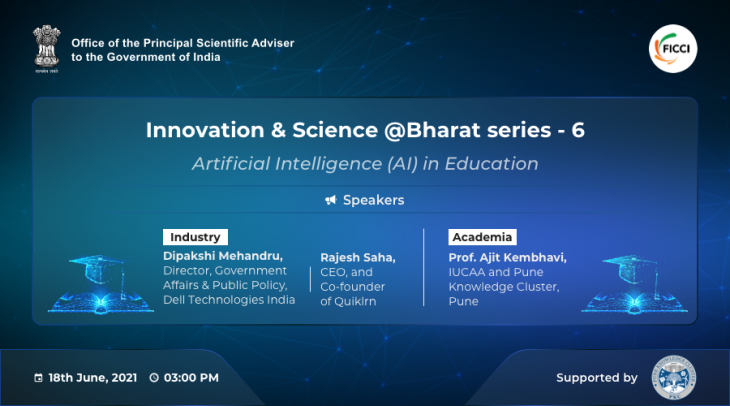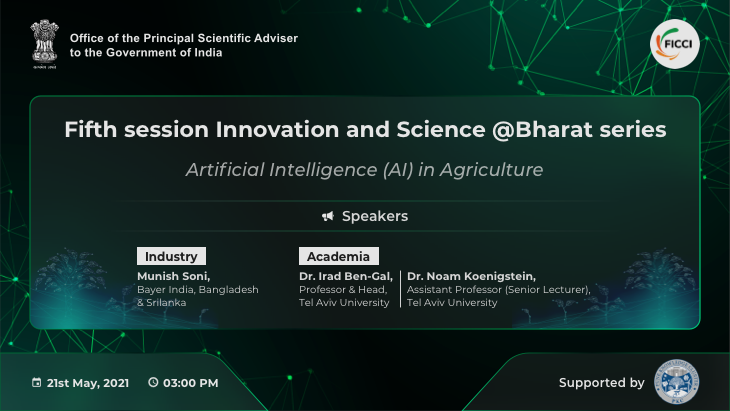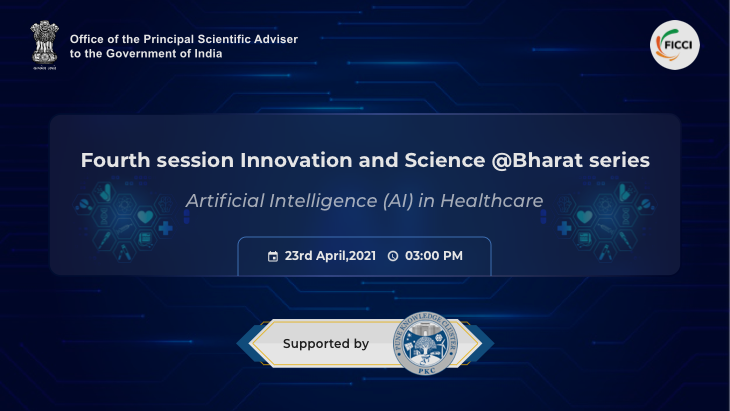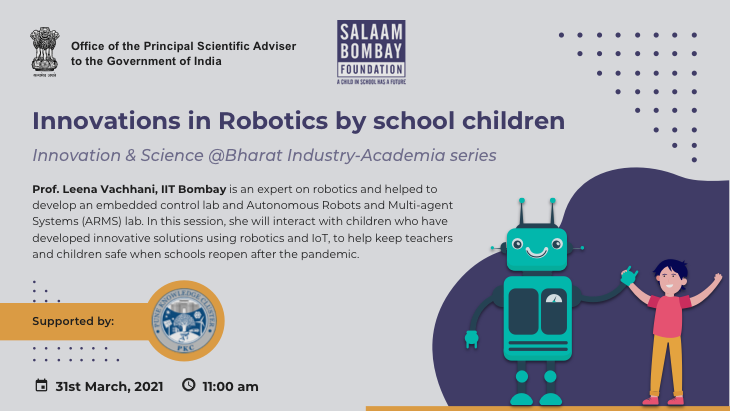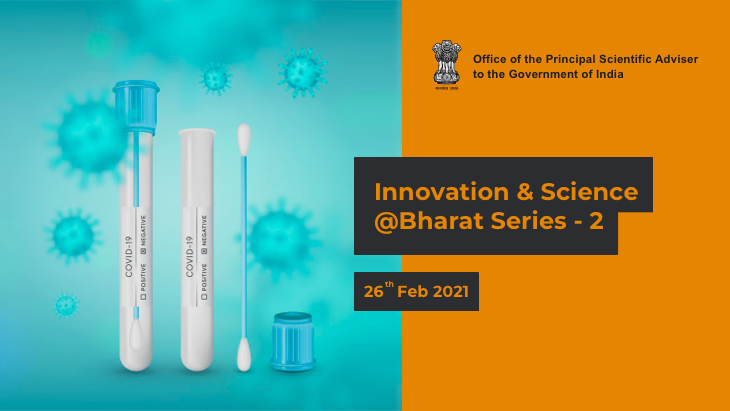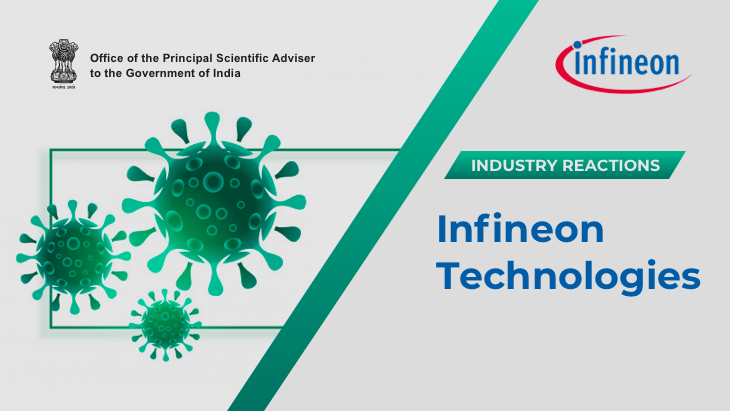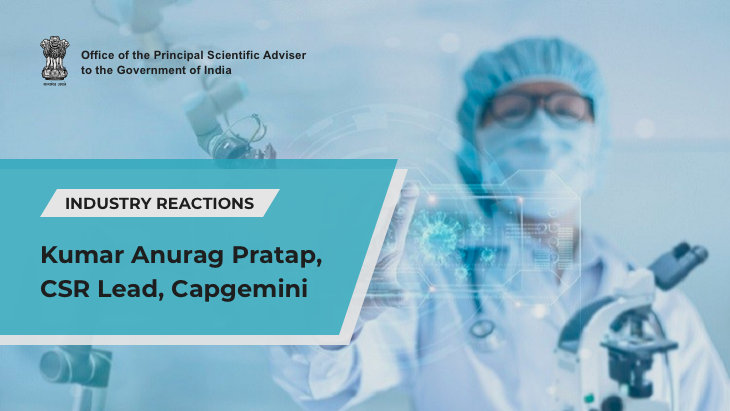
- A+
- A
- A-
Introduction
The Strategic Alliances division of the Office of Principal Scientific Adviser, facilitates partnerships between Industry, Foundation, academia, startups, MSMEs, through coalitions, consortia both national and international. Demand from the industries and foundations feed into academia and start-up ecosystem’s strategy of developing innovative solutions to meet them through deliberations initiated by the division. The Industry-Academia collaborations have supported (a) joint R&D or contracted industry R&D; (b) establishment of Centres of Excellence (CoE) by industry in academia, and (c) finding innovative solutions for social development. The division has, till date, worked on and completed around 250 projects (90 plus in progress). During April 2021-March 2022, the division brought in around INR 1570 Cr worth of opportunities benefiting 23 academic institutions, and around 80 plus start-ups.
Manthan
Manthan aims to empower various stakeholders to scale up the interactions with researchers/ innovators and facilitate R&D/ innovation, share challenges focused on emerging technologies, and other scientific interventions, as well as those with a social impact. It also provides an overview of the social impact of science and technology-based solutions.
Download the Compendium of Strategic Alliances Division
COVID-19 Projects
India is currently battling its second COVID-19 wave, which requires a more coordinated and focused approach to provide immediate relief to the people of India. The Government of India is working with various stakeholders to provide critical medical care to people who need it the most, while simultaneously preparing to expand its COVID-19 vaccination efforts from May 1, 2021, to cover all its citizens above 18 years of age.
Office of the Principal Scientific Adviser, Government of India (O/o PSA, GoI) is calling for private sector companies, donor organizations, and individuals to join India’s fight against COVID-19 by providing philanthropic funding to help scale up high-impact health technology and infrastructure solutions. They can do this by supporting 'Project Extension Hospitals' and 'Project O2'.
HUL funds study to delineate factors impacting COVID-19 vulnerability and vaccine efficacy
Download information on Project Hospital extension and Project O2
For more queries write to
industry-engagement@psa.gov.in
The country is in dire need of robust health infrastructure to prepare the country for this and future pandemics. The Office of PSA has reached out to State Governments to invite their interest to get CSR funding for building upon existent hospital infrastructure to enhance patient care across the country by equipping hospitals with more beds, oxygen concentrators, ventilators, and other necessary equipment. The States that reported the highest number of COVID-19 cases were reached out to on a priority basis. The state-wise list of hospitals that have reached out to office of PSA are listed along with their location, requirements, point-of-contact are included in this section and is being continuously updated. Organizations interested to fund any of these proposals are requested to write to industry-engagement@psa.gov.in.
Download information on Project Extension of Hospital
Read Doordarshan's coverage on "Project MediCAB: Augmentation of Hospital Infrastructure"
Project O2 caters to meeting the rising demand for medical oxygen by supporting hospitals to procure oxygen and related high priority equipment from approved manufacturers and start-ups, supporting manufacturers and start-ups to scale up capacity, addressing logistics challenges, enabling supplies to be extended/make-shift hospitals.
This project is facilitating at the national level supply of critical raw materials such as zeolites, setting up of small oxygen plants, manufacturing compressors, final products i.e. quality oxygen cylinders, concentrators, and ventilators.
The Innovation & Science @Bharat Series
The Innovation & Science @Bharat initiative of the Office of PSA has been facilitating industry and academia engagements for more than a year now. Building up these bridges taught us that there are lessons learned during these processes that are worth sharing with the scientific community as a whole. To continue this engagement, the Office of PSA has initiated Knowledge sharing webinar sessions, for details,
Success stories of Industry–Academia collaboration
COVID-19 changed the way we do science, develop technology-based solutions, and innovate. A lot of it also happened in India. One of the primary reasons it could happen is the encouragement that academia got through industry partnerships. It is in these partnerships that we saw, a textile-based company tapping its technological knowhow to make better fabrics for frontline workers at higher risk of getting infected; a philanthropic organization doing its bit to support epidemiological modeling to track the spread of infection across the country; a national bank allocating funds to propel an IIT’s efforts in drug repurposing, and a multinational corporation contributing for mass production of COVID-19 testing kits. Partnerships were made in numbers like never before, to accomplish common goals.
In the last two years after its formation, the division facilitated several thematic projects some of them on Health, Agriculture, Water, Sanitation, Future mobility, Climate action, Artificial Intelligence, Quantum, and Machine Learning. Of these, Health was the highest-funded thematic area with around INR 640.392 Cr.
The division worked with different Industry Sectors including PSUs, Foundations, BFSI, IT, Manufacturing sectors, etc. PSU is the highest funder for our projects with a funding of INR 352 Cr.
CSR Partnerships for COVID-19 research and technology solutions
Partnerships between academia and industries have had an enormous impact to ensure the fight against the COVID-19 pandemic is rapid and effective. As the vaccination drive begins, the partnerships need to diversify into areas important to ensure the roll-out reaches the last mile.
For more queries write to
industry-engagement@psa.gov.in
CSR Partnerships for S&T cluster proposals
The Science & Technology (S&T) Clusters are being established as formal umbrella structures for S&T organizations in various cities to have better synergy while retaining their autonomy and are supported by the Office of PSA on the recommendation of PM-STIAC to create an Atmanirbhar Bharat through S&T. The S&T clusters will create strong linkages between existing academic institutions, national & state research laboratories, and other stakeholders like relevant ministries, industry partners, start-ups, MSMEs, state governments, philanthropic foundations, and international organizations.
To accomplish their objectives towards the goal of strengthening the S&T ecosystem of the country, academic institutes from across the clusters have submitted proposals across thematic areas including emerging technologies and technologies for socio-economic development for CSR funding. The details of proposals received from different S&T clusters and the current status of evaluation/funding are here.
For more queries write to
industry-engagement@psa.gov.in
Gaps in the Ecosystem
A review of the current ecosystem of science and technology interactions between the Indian industry, academia, start-ups, and MSMEs indicates several gaps.



Cluster Mode
The plugging of gaps would assist in realizing a vibrant, effective, and thriving system that can support India’s social and economic development. The industry members are the ones that are best placed to identify the problems and challenges in society. The majority of the start-ups and MSMEs currently are out of the National incubation and research park’s ambit and do not receive formal capacity building. To alleviate these challenges, working in a cluster mode is essential to reduce duplication of efforts and to leverage the strengths of each other.
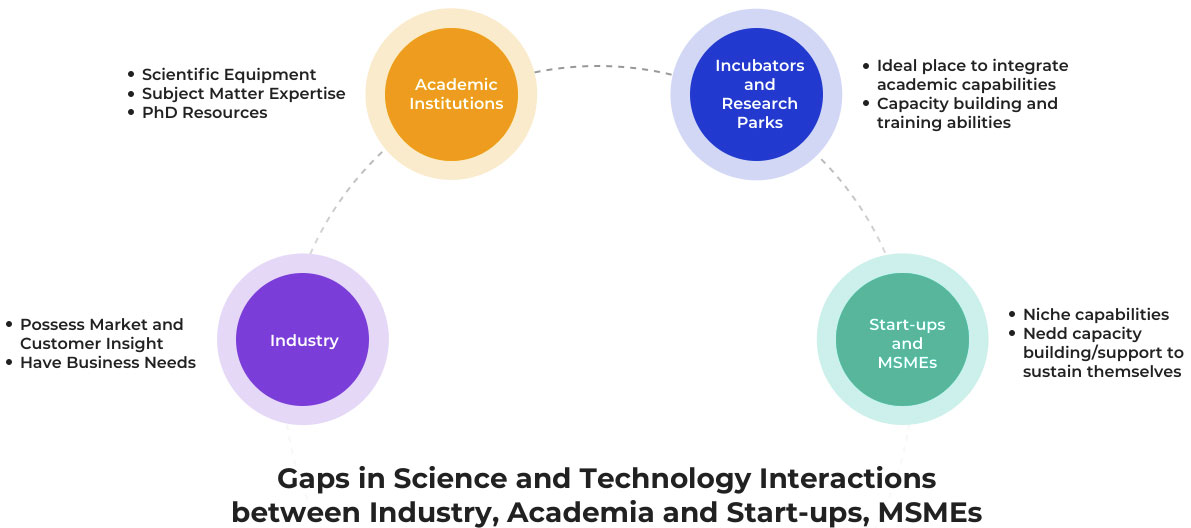
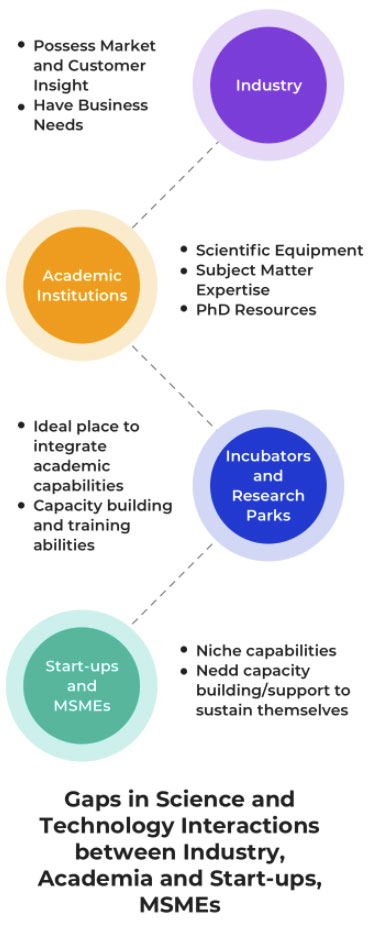
Industry led Science & Technologies Cluster development
The Office of PSA to the Government of India has proposed a facilitation process to develop these Science and Technologies Innovation clusters to work closely with Industry, Academia, and MSMEs/Start-ups. This would also ensure capacity building of the MSME sector. The end result of such collaborations would be optimal utilization of each other’s strengths and be able to develop technologies or provide scientific solutions for Social Development/National Missions.
Outreach initiatives/ Activities
Team
Director, Strategic Alliances

Industry academia engagement group


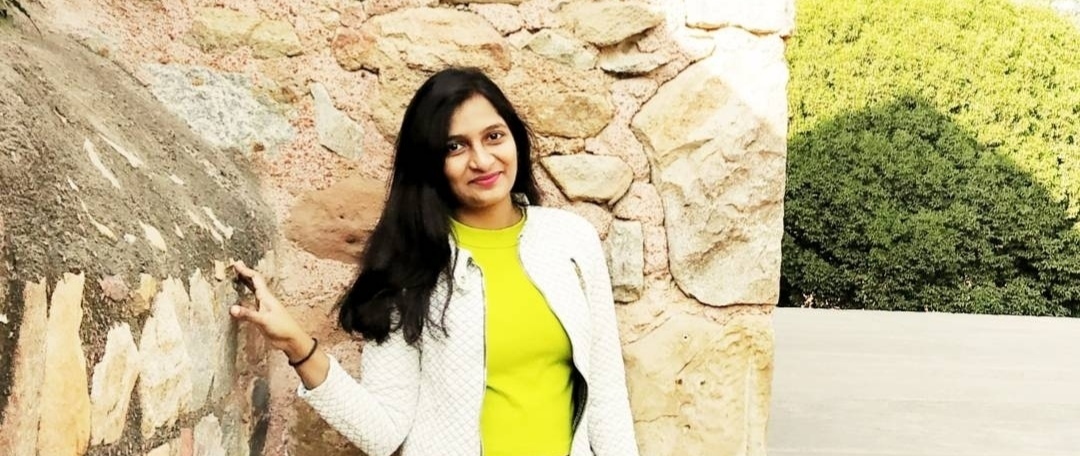
The industry in collaboration with academia and MSMEs/start-ups would develop new products and offerings.
The academia will get an opportunity to further the research in key areas as part of addressing the industry problems.
Start-ups and MSMEs can participate in providing solutions to the above challenges which would enable their growth and capacity building.
The country would ultimately benefit from this process by synergizing the combined strengths of these three pillars to address challenges in agriculture, water, waste management, and other key areas.
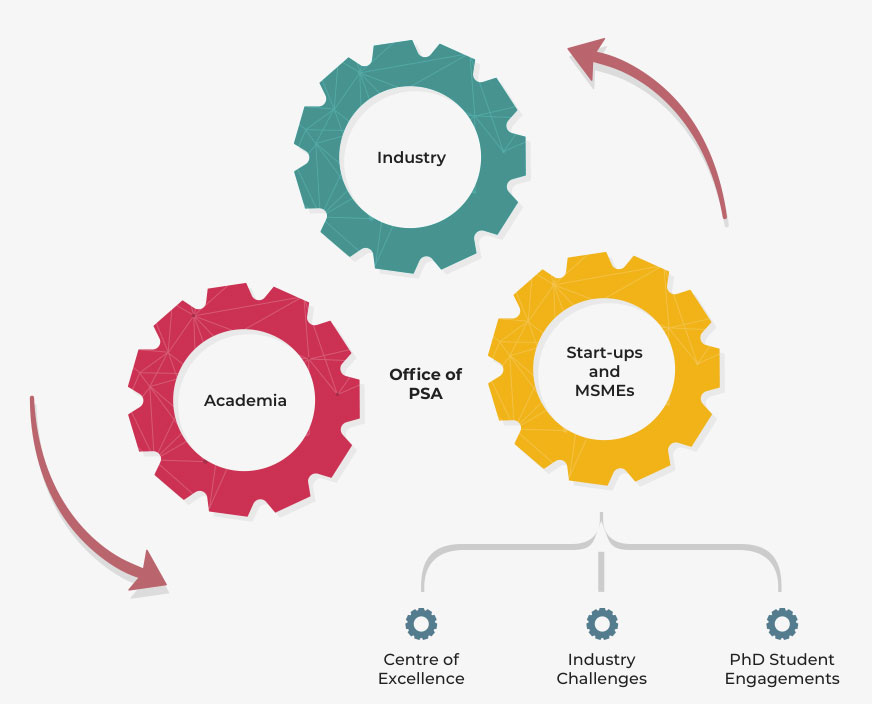
Benefits
- 01
The proposed facilitation process opens up many possibilities for collaborations and partnerships.
- 02
The industry-academia collaboration would support joint R&D and contracted R&D efforts to create new products (up to prototype stage).
- 03
It will facilitate the coming together of more than one academic institution to solve the industry problem, leading to a model of industry-academia collaboration with a cluster of institutes.
- 04
Involving the MSMEs and start-ups for component development and/or product manufacturing to address the industry problems by the industry-academia consortium would also result in capacity building of MSMEs/start-ups.
- 05
This will lead to new innovations resulting on account of cluster development through industry-academia and MSMEs/start-ups.
- 06
This collaborative structure can be leveraged to obtain innovative solutions for social development. Science and technologies are key for social impact in areas such as Water, Waste Management, Agriculture, Air pollution, etc.
- 07
It will also provide opportunities for Ph.D. Students, who contributed through research projects or special internships to solve industry-defined problems. As the facilitation process evolves, the entire Ph.D. student community in the country across disciplines can be integrated on a unified platform – which the industry and academia can tap to help and resolve the specific challenges.
The other possible structures for collaboration are the establishment of Centers of Excellence by either the industry or academia. Industry can set up a Centre of Excellence (CoE) in any academic institute or break it into smaller CoEs in different institutes to further the R&D and promote innovations using sophisticated equipment and lab facilities.
Intended Process for Collaboration
An indicative process that describes the facilitation process by the Office of the PSA, Government of India is detailed as below:
New R&D Problem
Disseminate the problem to STI cluster
Independent Evaluation of possible solutions
Formal MoU for project execution by industry and Academia
Implementing the solution by leveraging SMEs, Start-ups, Incubators
Achieve the intended results due to successful collaborative execution.
Intended Process for Collaboration
An indicative process that describes the facilitation process by the Office of the PSA, Government of India is detailed as below:
- To begin with, Industry partners would share the R&D or the new product problem statement or request for setting up of CoE on any emerging technology with the Office of the PSA, GoI.
- Upon receiving a new R&D/product problem, the Communication team at the Office of PSA, GoI would share the challenge (details of the problem) with all Science and Technologies clusters, Institutes of Eminence, National Incubators, Startup India, AGNI Invest India, Atal Incubators.
- The interested academic institution(s) [individually or collectively] and/or MSMEs and startups can then provide a proposal/approach on how they would work to solve the identified problem.
- The Office of the PSA, GoI would collate the proposals and share the same with the Industry partner. It can also help the Industry in getting an independent market assessment done by experts in the domain, to help the industry make the decision on whether to fund the academic institute for the product/prototype development or whether it is more feasible for in-house execution.
- Upon identification of the best route/path to proceed, the selected academic institute and Industry to undertake an MoU and execute the project until the prototype stage. If the optimal path necessitates a requirement of a supply chain outside of the Industry, the consortium of the Institute and Industry can jointly handpick the MSMEs or start-ups to fulfill the requirements.
- Execution of the project under the MoU will be monitored by the Office of PSA, GoI to ensure the production of required outcomes.
Upon successful prototyping stage, Industry will further execute the product development activities, leading to introduction and sales of the new product offerings. All the above activities shall be facilitated through an online portal supported by the Office of the PSA, GoI, eventually leading to successful STI cluster development. The Portal over has the potential to become an integrated platform for STI-led innovation for the country.
The initial outputs of the industry-academia collaboration, or the CoEs that get established as a response to the Industry request can then serve as national knowledge assets which can be harnessed for capacity building/reuse based on the context and requirements.
Call for Proposals
- Inviting proposals for cost-effective technology for web & mobile based tools for mapping water supply network on GIS network in rural areas with provision of grievances redressal by the Ministry of Jal Shakti
- Call for proposals “the G20 Digital Innovation Alliance (G20-DIA) to recognize and support innovators that have digital solutions” by the MEITY
- Call for proposals “Effective method to extract coal standing on pillars below infrastructure/developed” by the Ministry of Coal
- Call for proposals "Introduction of Dry-Drilling System in Bolter in Continuous Miner Pan” by the Ministry of Coal
- Call for proposals "to analyse Poshan Abhiyan data for predictive and pattern modelling using Artificial intelligence and Machine Learning” by the Ministry of Women and Child Development
- Inviting proposals for "Extraction of thick coal seams from underground mines" by the Ministry of Coal
- CII Startupreneur Awards 2022: For WayCool Foods and Products Pvt. Ltd. by CII Centre of Innovation Entrepreneurship and Startups
- IP Manthan 3.0 by Office of the Controller General of Patents Designs and Trademarks
- Idea Pitches & panel discussions - Prabhaav | प्रभाव Innovation Grand Challenge by IIT Palakkad
- Call for Design Vetting / Verification of Automatic Power-shift Transmission with 1200hp Transmission Power Rating by BEML Limited
- Inviting Applications for Reliance Foundation Scholarships by Reliance Foundation
- Mobile Cold Storage Technology Solutions To Transport Self Help Groups Perishable Agriculture and Dairy Products By the Ministry of Rural Development
- Webinar: Why Should Countries Invest in Science? by India International Centre
- Calls for Proposals for Indigenously developed cost effective technology for Animal Identification and Traceability of Bovines by Department of Animal Husbandry and Dairying
- Call for Application - Venture Challenge 6.0 by Atal Incubation Centre - Shiv Nadar University
- Spirit Of Manufacturing Awards by The Indus Entrepreneurs
- Webinar: Growth vs Sustainability: Can EVs achieve both? by The Indus Entrepreneurs
- SDG School 2023 - Call for Applications by Makers Asylum
- Webinar: The Legal Side of Raising Capital for Startups - Legal Helpline by The Indus Entrepreneurs
- Call for Proposals for Indigenous Sex Sorted Semen Production Technology for Bovine Semen by Department of Animal Husbandry and Dairying
- Biotechnology Ignition Grant (BIG) by Biotechnology Industry Research Assistance Council (BIRAC) | Startup Incubation and Innovation Centre, IIT Kanpur
- Inviting Applications for Prabhaav | प्रभाव INNOVATION GRAND CHALLENGE by IIT Palakkad
- Inviting Applications for Sourcing suitable Material of Construction for selection of Cathodes material for electrolysis in the production of Electrolytic Manganese Dioxide (EMD) by MOIL Limited
- Inviting Applications for Prajjwala Challenge by the Ministry of Rural Development
- Inviting Applications for Novel Applications of Phosphogypsum by Coromandel International Limited
- Call for Proposals for Inviting Applications for Science & Technology Projects in Green Hydrogen and CO2 Sequestration by RM Tulpule Charitable Trust (Publication Date: 10 Jan, 2023)
- Call for Proposal for Inviting Applications for Electraverse Sparks Startup Challenge by Climate Collective Foundation (Publication date: 30 Dec, 2022)
- Call for Proposal for Inviting Applications for Bayer Fellowship Program by Bayer CropScience Limited in association with the Bhubaneswar City Knowledge Innovation Cluster (BCKIC) Foundation (Publication date: 30 Dec, 2022)
- Call for Proposal for Inviting Applications for ClimateXHealth Challenge by PATH (Publication date: 30 Dec, 2022)
- Call for Proposal for Inviting Applications for HealthHacks Hackathon 2023 by Atal Incubation Centre – CCMB (Publication date: 30 Dec, 2022)
- Call for Proposal for Inviting Applications for QETCI Fellowship by Quantum Ecosystems and Technology Council of India (Publication date: 26 Dec, 2022)
- Call for Proposal for Inviting Applications for the Udgam Startup Innovation Challenge by HPCL (Publication date: 21 Dec, 2022)
- Call for Proposal for Inviting Applications for National Technology Awards 2023 by Technology Development Board, DST, GoI (Publication date: 21 Dec, 2022)
- Call for Proposal for Inviting Applications for EnterpriseHER: 12 Months Women Incubation Program by IIM Lucknow Enterprise Incubation Centre (Publication date: 12 Dec, 2022)
- Call for Proposal for PRAKSHEPAN – An Open pitch event at Technology Innovation Foundation by IIT Palakkad (Publication date: 12 Dec, 2022)
- Call for Proposal for Mission DefSpace - Defence Space Challenges by iDEX Dio (Publication date: 15 Nov, 2022)
- Call for Proposal for ActInSpace Hackathon by Open Startups (Publication date: 11 Nov, 2022)
- Call for Proposal for Green Bengal Innovation Contest by SwitchON Foundation (Publication date: 9 Nov, 2022)
- Call for Proposal for Pharmaceutical Innovations by Technology Development Board, DST (Publication date: 9 Nov, 2022)
- Call for Proposal for Hydrogen Valley Platform in India by DST (Publication date: 19 Oct, 2022)
- Call for Proposal for Industry Research & Development Fellowship Programme (IRDFP) 2022 by DST and India Energy Storage Alliance (IESA) (Publication date: 17 Oct, 2022)
- Call for Proposal for Commercialization of Indigenous Innovative Technologies by TDB, DST (Publication date: 4 Oct, 2022)
- Call for Proposal for Space Kidz India’s Young Scientist India program (Publication date: 4 Oct, 2022)
- Call for proposal for MeitY - AWS Quantum Computing Applications Lab (QCAL) (Publication date: 27 Sep, 2022)
- Inviting Applications for Carbon Zero Challenge 2022 – Circularity for Resource Conservation and Sustainability by IIT Madras (Publication date: 30 August, 2022)
- Applications for Maharashtra Startup Yatra by Maharashtra State Innovation Society (Publication date: 29 August, 2022)
- DISQovery2022-Innovate for Purposeful Impact (Results)
- Electric Vehicle Innovation Challenge - EVangelise '22 by iCreate (Publication date: 24 August, 2022) (Results)
- Call for Applications for Quantum Science and Technology Hackathon 2022 (Publication date: 16 August, 2022) (Results)
- MECS’s Entrepreneurship Development Programme in Clean Cooking 2022 (Publication date: 14 July, 2022) (Results)
- Applications for FLCTD Low Carbon Technology Accelerator Program 3.0 (Publication date: 19 May, 2022) (Results)
- Call for Proposal for “XPRIZE Carbon Removal Competition" by XPRIZE (Publication date: 5 April, 2022) (Results)
- Applications invited for TCS Pre/Post-Doc Fellowship and Apprentice Program (Publication date: 27 Nov, 2021) (Results)
- Applications Invited for ATF Cohort 4 Acceleration Program for Assistive Technology Startups (Publication date: 27 Nov, 2021) (Results)
- Applications Invited for ATF Cohort 4 Acceleration Program for Assistive Technology Startups (Publication date: 27 Nov, 2021) (Results)
Other Initiatives

Umang
UMANG provides a single platform for all Indian Citizens to access pan India e-Gov services ranging from Central to Local Government bodies and other citizen-centric serv ...

Kisanmitr
KisanMitr – Friends of the Farmers project is an initiative of the Office of PSA, GoI. This project aims to make Indian farmers more self-reliant by giving them insight ...




